最新外研版高中英语必修三module3教案
高一英语(外研版)-必修三 Unit 3 The world of science(1)-1教案
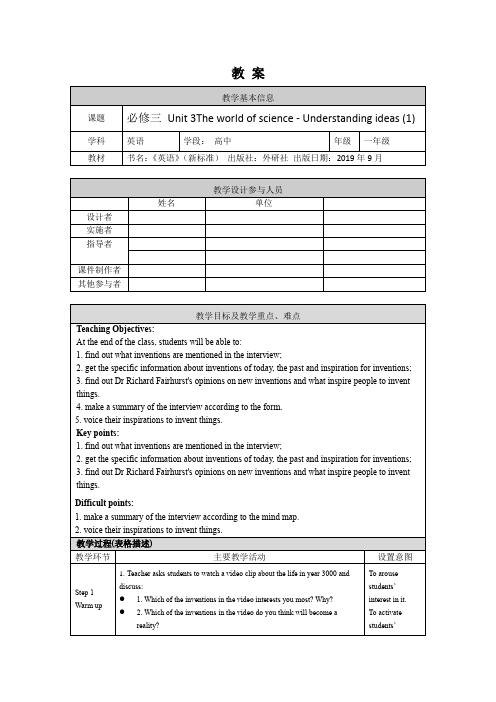
At the end of the class, students will be able to:
1. find out what inventions are mentioned in the interview;
2.get thespecific information aboutinventions of today, the past and inspiration for inventions;
To improve students’ abilityofgettingandintegratingthe specific information aboutinventions of the past and today and inspiration for inventions.
2.After thatteacher asks Students to discuss the answers in group and check the answers.
1. Who is the interviewee?
2. What information does the interviewer want to get from the interviewee?
To lead the students to get the main idea of the interview.
Then the teacheraskssomestudents to share their opinions in class.
To motivate students to share theirquestions to the inventor andopinions ofinspiration for invention.
高中英语外研版必修3教案Module3(20页)
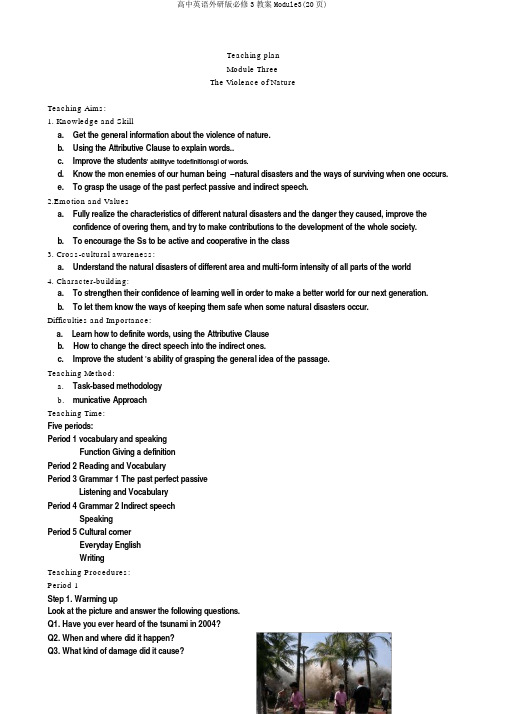
Teaching planModule ThreeThe Violence of NatureTeaching Aims:1.Knowledge and Skilla.Get the general information about the violence of nature.ing the Attributive Clause to explain words..c.Improve the students’ abilityve todefinitionsgi of words.d.Know the mon enemies of our human being –natural disasters and the ways of surviving when one occurs.e.To grasp the usage of the past perfect passive and indirect speech.2.Emotion and Valuesa.Fully realize the characteristics of different natural disasters and the danger they caused, improve theconfidence of overing them, and try to make contributions to the development of the whole society.b.To encourage the Ss to be active and cooperative in the class3.Cross-cultural awareness:a.Understand the natural disasters of different area and multi-form intensity of all parts of the world4.Character-building:a.To strengthen their confidence of learning well in order to make a better world for our next generation.b.To let them know the ways of keeping them safe when some natural disasters occur.Difficulties and Importance:a.Learn how to definite words, using the Attributive Clauseb.How to change the direct speech into the indirect ones.c.Improve the student ’s ability of grasping the general idea of the passage.Teaching Method:a.Task-based methodologyb.municative ApproachTeaching Time:Five periods:Period 1 vocabulary and speakingFunction Giving a definitionPeriod 2 Reading and VocabularyPeriod 3 Grammar 1 The past perfect passiveListening and VocabularyPeriod 4 Grammar 2 Indirect speechSpeakingPeriod 5 Cultural cornerEveryday EnglishWritingTeaching Procedures:Period 1Step 1. Warming upLook at the picture and answer the following questions.Q1. Have you ever heard of the tsunami in 2004?Q2. When and where did it happen?Q3. What kind of damage did it cause?Q4. Can you list some of other natural disasters?Q5. Tsunamis are natural occurrences. Can humanbeings stop them?Suggested answers:Q1. Yes.Q2. At the end of 2004, a massive earthquake sent tsunami smashing into Indian Ocean coastline. Many heavily populated areas disasters from it.Q3. Sri Lanka , Indonesia , Thailand , India, Malaysia and East Africa destroyed by the monster waves, causing millions of deaths.Q4. Flood, Fire, drought, landslide, earthquake, tornado, hurricane and so on.Q5. No. Tsunamis are a natural occurrence related to the processes that shape the Earth's surface — earthquakes, volcanoes, and landslides. These processes are driven by the heat escaping from the Earth and gravity, and people cannot control these underlying forces.Step 2. Vocabulary LearningMatch the words in the box with their definitions.Flood hurricane lightning thunderstorm tornado1. a lot of water in an area which is usually dry2. a very strong wind or storm3. a lot of rain falling quickly, with loud noises and flashes of light4.the flash of light which happens during a thunderstorm5. a column of air that turns very quickly.Each sentences gives a definition of a word.The Attributive Clause appears in each sentence.When we give a definit ion of a word, the Attributive Clause is usually necessary and hopeful. Welearn to use the structure“ A is B that/which”Step 4 PracticeGive definitions of the words following the pattern“ A is B that/which .”An earthquake a volcanic eruption a plane crashSuggested answers:1.An earthquake happens when the earth shakes because of movement underground.2. A volcanic eruption is that lava and ash ing out of a volcano.3. A plane crash is that a plane stopping flying and crashing into the earth.4.Which kind of these natural disasters have ever experienced? Can you describe it?5.Have you ever read a news story about one of the events? Can you describe it?6.Do you know anything about the events? For example, what causes them?Homework:1.Surf the Internet in order to have a better understanding of natural disasters.2.Preview the passage in Reading and Vocabulary.Period 2Step 1 Pre-readingRead about the Gulf Steam and check the meaning of the words:1, What is a current ?(a) A kind of electricity(b) A movement of water(c) A kind of wind2, What kind of things flow ?(a) Water(b) Time(c)Money3, If two places are on the same latitude ,they are on the same line _____(a)east/west(b)north/southSuggested answers:b. a . aa.SkimmingRead the passage quickly and silently. Find the words and expressions in the passages and match them with the definition.bury disaster feather fur occur tropical1 you can see this on an animal__________2 describing the hottest parts of the earth, north and south of the equator__________3 a terrible event_________4 you can see these on a bird_________5 to place in the ground or tomb ___________6 to happen __________Suggested answers:1. fur2. tropical3. disaster4. feather5. bury6. occurb. Detailed-reading1.How strong are tornado winds?2.What can happen to furniture when a house is destroyed by a tornado?3.How many tornadoes are there in the US every year?4.How many people died in the worst tornado of all time?5.What happens at sea during a hurricane?6.When was the worst hurricane of all time?7.Was the actor Charles Coghland killed in it?8.What happened to him after the hurricane?1.More than 400 km/h.2.It stays where it was.3.About 800.4.More than 700.5.It has huge waves.th6. 8September, 1900.7.No, he wasn ’t.8.His coffin was dropped in the sea by a hurricane and carried to Canada by the Gulf Stream.Step 3 Post-readingRead the passage again and fill in the form with suitable words.Tornado HurricaneDefinitionTimesPlacePhenomenaBad resultsThe worst example you knowSuggested answers:Tornado HurricaneDefinition A rotating column of Strong tropical storm.air from athunderstorm to theground.Times800in the US each 6 Atlantic hurricanesyear each yearPlace From Texas in the Occur in the southernsoutheast to South Atlantic Ocean,theDakota in the north Caribbean Sea and theGulf of MexicoPhenomena Have winds of more Violent winds of120than400kilometers kilometers per hour orper hour more,Bad results Pick up cars, trains Cause huge waves,and even houses and heavy rain and floodsput them down in thenext street;take thefur and feathers off;destroy houses butleave the furniturewhere it wasthThe worst example you know Occurred in 1925Occurred on the8September 1900inGalveston, Texas.Step 4 Language Explanations【条 1】occur【文原句】 Almost all of them occur in the US, in the area from Texas in the southeast to South Dakota in the north. (Page23)【点】 occur 此意“ 生” ,不及物,没有被。
高中英语Module3TheViolenceofNatureSectionⅣOtherPartsoftheModule教学案外研版必修3
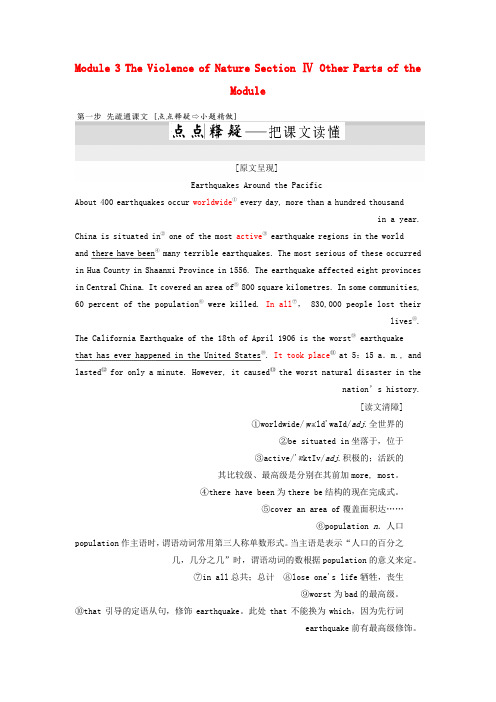
Module 3 The Violence of Nature Section Ⅳ Other Parts of theModule[原文呈现]Earthquakes Around the PacificAbout 400 earthquakes occur worldwide ①every day, more than a hundred thousandin a year.China is situated in ②one of the most active ③earthquake regions in the world many terrible earthquakes. The most serious of these occurred ④there have been and in Hua County in Shaanxi Province in 1556. The earthquake affected eight provinces in Central China. It covered an area of ⑤800 square kilometres. In some communities, 60 percent of the population ⑥were killed. In all ⑦, 830,000 people lost theirlives ⑧.The California Earthquake of the 18th of April 1906 is the worst ⑨earthquake and m., .15 a :at 5 ⑪It took place . ⑩that has ever happened in the United States lasted ⑫for only a minute. However, it caused ⑬ the worst natural disaster in thenation ’s history.[读文清障]①worldwide/ˌw ɜːld'waId/adj .全世界的②be situated in 坐落于,位于③active/'æktIv/adj .积极的;活跃的其比较级、最高级是分别在其前加more, most 。
2021年高中英语新外研版 必修第三册Unit 3 The world of science—教案

Unit 3 The world of scienceStarting out & Understanding ideas【教材分析】In this period, students will look at some pictures presenting inventions from famous novels. Besides that, through watching a video, students can learn about other inventions which can arouse their interest in scientific creations.The reading material is an interview, in which Dr Richard, the author of The New Age of Invention is invited to talk about human’s inventions. Before reading, the lead-in part will guide students to think about the significance of human’s inventions and reasons why the inventions were made. After reading, students are expected to voice their opinions about what inspires people to continuously invent things.【教学目标】1. Lead students to talk about the influence of inventions on human and predict future inventions by watching a video.2. Have students get the main idea of the text by skimming and identity the interviewee’s opinions about the new age of invention.3. Guide students to learn about the features of interview articles and get the gist of the conversation.4. Guide students to think about inspiration for inventions and cultivate a spirit of innovation.【教学重难点】1. Guide students to talk about how the way of our life has changed and reasons behind these changes.2. Guide students to master reading skills and develop their reading ability.3. Have students talk about what inspires people to invent things and future possible inventions.【教学过程】Step 1 Starting out1. Lead students to look at the four pictures with descriptions and talk about the imaginary inventions from famous novels.2. Guide students to learn about some inventions by watching a video.3. The students talk about the invention which interests them most and give their reasons. Step 2 Pre-reading1. Students look at the pictures and describe the differences.2. Students discuss why the way we live has changed over time.Step 3 First readingSkim the text and find out the answers to the following the questions.1. What inventions are not mentioned in the interview?A. The four great inventions in Ancient China.B. The great western inventions.C. Computing technology and solar technology.D. Space technology and medical technology.2. Which of the following statements is not true?A. Dr Richard thinks the present day is a new age for inventions.B. Lots of new inventions are based on technologies.C. Dr Richard is an inventor himself.D. A strong desire to create things can make it a reality to invent things.3. What kind of book do you think is the book The New Age of Invention?A. A travel guide.B. A science fiction.C. A autobiography.D. A popular science book.Step 4 Further reading1. Help students tell opinions from facts and choose the statements describing Dr Fairhurst’s opinions.1) Inventions in Ancient China were better than those in the West.2) A lot of today’s great inventions are tech-based.3) Today, most inventors prefer working by themselves.4) The desire to solve problems inspires invention.5) A time machine will definitely be invented in the future.2. Guide students to comb the structure of the text and complete the mind map withStep 5 Post reading1. Work in groups. Have students think about what else inspires people to invent things.2. Ask some students to share their opinions with the class.Step 6 Language appreciation1. It (the title of the book) suggests that the present day is a new age for inventions.[句式分析]本句中“suggest”意为“表明”引导的宾语从句“that the present day is a new age for inventions”,从句用“陈述语气”。
外研版高中英语必修3全套教案
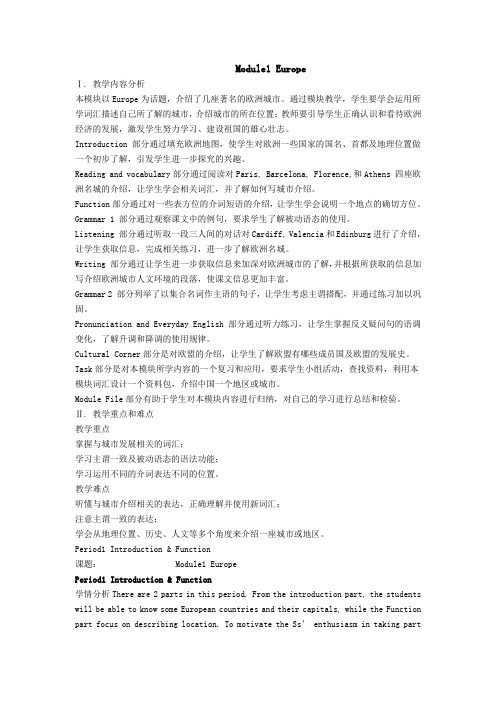
Module1 EuropeⅠ. 教学内容分析本模块以Europe为话题,介绍了几座著名的欧洲城市。
通过模块教学,学生要学会运用所学词汇描述自己所了解的城市,介绍城市的所在位置;教师要引导学生正确认识和看待欧洲经济的发展,激发学生努力学习、建设祖国的雄心壮志。
Introduction 部分通过填充欧洲地图,使学生对欧洲一些国家的国名、首都及地理位置做一个初步了解,引发学生进一步探究的兴趣。
Reading and vocabulary部分通过阅读对Paris, Barcelona, Florence,和Athens 四座欧洲名城的介绍,让学生学会相关词汇,并了解如何写城市介绍。
Function部分通过对一些表方位的介词短语的介绍,让学生学会说明一个地点的确切方位。
Grammar 1 部分通过观察课文中的例句,要求学生了解被动语态的使用。
Listening 部分通过听取一段三人间的对话对Cardiff, Valencia和Edinburg进行了介绍,让学生获取信息,完成相关练习,进一步了解欧洲名城。
Writing 部分通过让学生进一步获取信息来加深对欧洲城市的了解,并根据所获取的信息加写介绍欧洲城市人文环境的段落,使课文信息更加丰富。
Grammar 2 部分列举了以集合名词作主语的句子,让学生考虑主谓搭配,并通过练习加以巩固。
Pronunciation and Everyday English 部分通过听力练习,让学生掌握反义疑问句的语调变化,了解升调和降调的使用规律。
Cultural Corner部分是对欧盟的介绍,让学生了解欧盟有哪些成员国及欧盟的发展史。
Task部分是对本模块所学内容的一个复习和应用,要求学生小组活动,查找资料,利用本模块词汇设计一个资料包,介绍中国一个地区或城市。
Module File部分有助于学生对本模块内容进行归纳,对自己的学习进行总结和检验。
Ⅱ. 教学重点和难点教学重点掌握与城市发展相关的词汇;学习主谓一致及被动语态的语法功能;学习运用不同的介词表达不同的位置。
高一英语外研版3教案:Module3 TheViolenceofNaturePeriod2含解析
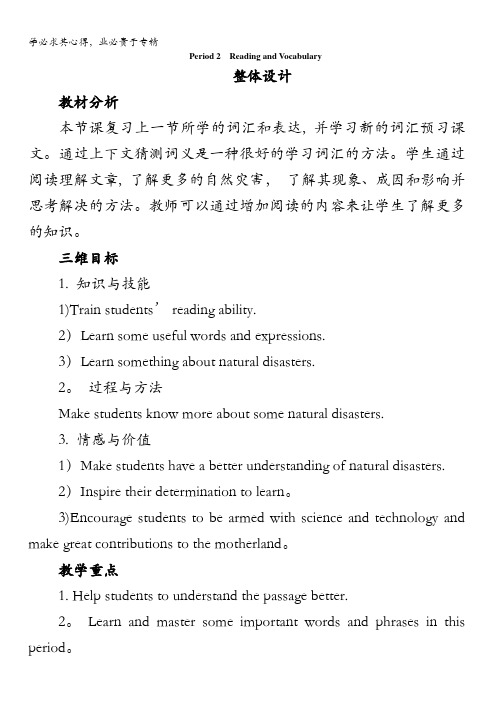
Period 2Reading and Vocabulary整体设计教材分析本节课复习上一节所学的词汇和表达, 并学习新的词汇预习课文。
通过上下文猜测词义是一种很好的学习词汇的方法。
学生通过阅读理解文章, 了解更多的自然灾害,了解其现象、成因和影响并思考解决的方法。
教师可以通过增加阅读的内容来让学生了解更多的知识。
三维目标1. 知识与技能1)Train students’ reading ability.2)Learn some useful words and expressions.3)Learn something about natural disasters.2。
过程与方法Make students know more about some natural disasters.3. 情感与价值1)Make students have a better understanding of natural disasters.2)Inspire their determination to learn。
3)Encourage students to be armed with science and technology and make great contributions to the motherland。
教学重点1. Help students to understand the passage better.2。
Learn and master some important words and phrases in this period。
教学难点1. How to help students improve their reading ability and understand the passage better.2。
How to master the important language points in this passage.教学方法1。
外研版高中英语必修3第3模块教学设计2

教学设计《Module3 The Violence of Nature》教学设计(2011年5月)科研所通河一中吕萍一、教学课型:阅读课。
二、教材分析:The Violence of Nature是外研版Book 3 Module 3的一篇阅读文章,文章共分3部分,分别介绍了两种自然灾害——龙卷风和飓风的形成和危害及一次异常事件。
三、教学目标:1. 让学生识记并能正确运用以下词汇:ash, bury, current, disaster, erupt, flow, latitude, lava, occur, tornado, tropical, hurricane, pick up, take off, on average, end up。
2. 学习过去完成时的被动语态的用法。
3. 理解含有所学生词、含有过去完成时的被动语态和间接引语的句子和段落,读懂其意义并获取信息;理解模块提供的和来自其他渠道的对不同自然灾害的介绍并获取信息。
4. 引导学生整体把握文章主旨,提高阅读效率;鼓励学生开展小组合作,运用副词表达好消息和坏消息。
5. 了解自然灾害的危害,结合发生在我国的两次大地震及甘肃省舟曲县的泥石流,激发学生学好科学文化知识的决心和信心,以实际行动作好与自然灾害作斗争的准备,为人类造福。
四、教学重点和难点:1. 通过阅读理解词汇,通过词汇学习掌握文章主旨,加深对文章的理解。
2. 理解文章中含有定语从句的句子及含有过去完成时的被动语态的句子。
3. 联系实际,了解不同的自然灾害带来的危害,激发学生利用所学知识与自然灾害作斗争的决心。
五、教学过程:StepⅠWarming upShow a video “Storm Chasers” and some pictures about tornado, hurricane and other natural disasters to lead in the topic of this passage.[设计说明]使用多媒体视频及图片生动、形象地展示与文章相关资料,更直观地展现自然灾害的威力,吸引学生注意,激发他们的学习兴趣和决心。
高中英语外研版必修三Module 3 The Violence of Nature教案

Module3 The Violence of Nature一、教材分析1. 话题:本阅读课是围绕整个单元的中心话题“The Violence of Nature”而展开的。
2. 内容:本文描述了龙卷风和飓风这两大自然灾害爆发的时间、地点、情形、经过、最后的结果、造成的危害、人员财产损失的情况。
最后以Charles Coghlan 的经历讲述了一个与飓风有关的离奇故事。
3. 目标:①扫清课文中出现的生词障碍;②理解课文内容,理清篇章的组织脉络;③引导学生学会根据主题理解文章细节的能力和根据关键词复述课文的能力。
二、教学实践1.教学步骤step 1. Warming up1)以introduction 部分的图片入手,引出本课关于自然灾害的词汇,然后用brainstorm的形式让学生快速想出相关词汇。
2) Discussion: Have you ever experienced such an event or read a news story about one of the events? Can you describe it? 让全班学生两人一组互相讲述自己的经历,有利于激发学生说的兴趣,在学生的相互交流中培养起发现问题和解决问题的能力,然后让个别学生起来展示,培养学生的自信心和表达能力,同时也自然过渡到了本节主题。
Step 2. Reading1)Skimming 快速阅读全文,理清大意;2)Scanning ①细读文章,回答part2 的问题。
提问学生展示答案,针对有问题的答案让学生讨论后再做纠正,培养其自主解决问题的能力。
②然后再从definition,speed,phenomena and worst event 几个方面比较tornado and hurricane的不同之处,旨在培养学生理解细节和提取信息的能力。
3)Exercise 进一步加强学生对文章的理解。
Step 3. Post-readingRetell the passage.组织学生重述课文内容来加强学生对全文的理解,同时也锻炼了学生的口语能力。
外研版英语必修三教案
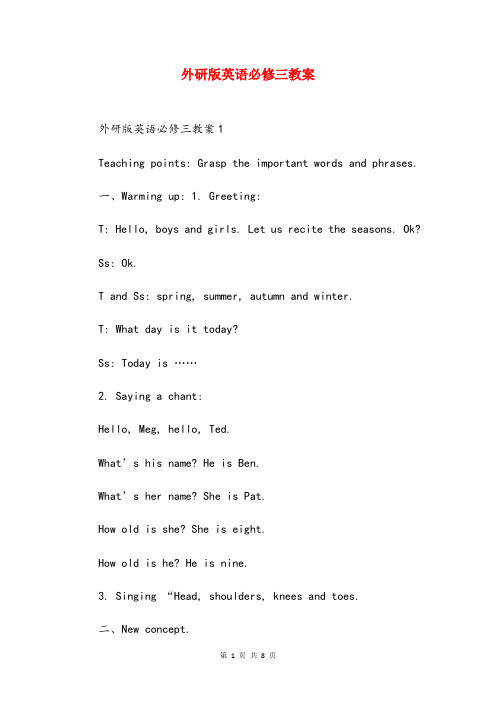
外研版英语必修三教案外研版英语必修三教案1Teaching points: Grasp the important words and phrases.一、Warming up: 1. Greeting:T: Hello, boys and girls. Let us recite the seasons. Ok? Ss: Ok.T and Ss: spring, summer, autumn and winter.T: What day is it today?Ss: Today is ……2. Saying a chant:Hello, Meg, hello, Ted.What’s his name? He is Ben.What’s her name? She is Pat.How old is she? She is eight.How old is he? He is nine.3. Singing “Head, shoulders, knees and toes.二、New concept.T: Oh, you are great .Today let us learnModule 6ActivitiesUnit 1 What do you do at the weekend? (Writing and reading) 1. T: Do you like playing football?Ss: Yes, I do.T: What do you do at the weekend? (explain in Chinese ) Ss: I play basketball.T: I like reading at the weekend .What about you?Ss: I like swimming.T: You are great.T: And what do you have at school?You can say: I have ……Ss: I have English and Chinese.T: Do you like maths?Ss: Yes, I do. / (No, I don’t.)T: What do you do at 5 o’clock in the morning?I sleep in the morning. What about you?Ss: I sleep too.2. Do exercises: On the board write the following list1) What do you do at the weekend?I………..2) What do you have at school?I have …… and ……3. Listen and say. Play the tape, pause it after each utterance and let theSs repeat the sentences.4. Show the Ss some books .For example “Maths”“Chinese”“Science”Show the Ss some pictures “football”“sleep”“swimming5. Text 1) Listen and look.2) Answer questions:What do you do at ……o’clock in the morning?What do you have at school?三、Homework: 1) Read the text frequently and recite the text.2) Copy the following sentences 2 times.What do you do at the weekend?What do you have at school?外研版英语必修三教案2教学重点:words and phrases: half, past, have breakfast / dinner教学难点: What’s the time,please?It’s half past six.I have breakfast at half past six.热身复习:老师出示6个动词词组,同学读,并讲出每个词组的意思。
英语必修ⅲ外研版module3教案3
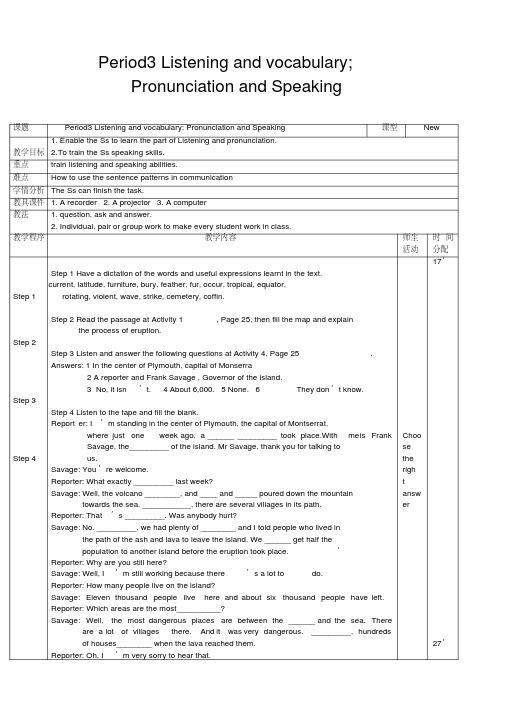
Period3 Listening and vocabulary;Pronunciation and Speaking课题Period3 Listening and vocabulary; Pronunciation and Speaking 课型New教学目标1. Enable the Ss to learn the part of Listening and pronunciation.2.To train the Ss speaking skills.重点train listening and speaking abilities.难点How to use the sentence patterns in communication学情分析The Ss can finish the task.教具课件 1. A recorder 2. A projector 3. A computer教法 1. question, ask and answer.2. Individual, pair or group work to make every student work in class.教学程序教学内容师生活动时间分配Step 1 Step 2 Step 3 Step 4 Step 1 Have a dictation of the words and useful expressions learnt in the text.current, latitude, furniture, bury, feather, fur, occur, tropical, equator,rotating, violent, wave, strike, cemetery, coffin.Step 2 Read the passage at Activity 1, Page 25, then fill the map and explain the process of eruption.Step 3 Listen and answer the following questions at Activity 4, Page 25.Answers: 1 In the center of Plymouth, capital of Monserra2 A reporter and Frank Savage , Governor of the island.3 No, it isn’t.4 About 6,000.5 None.6 They don’t know.Step 4 Listen to the tape and fill the blank.Report er: I’m standing in the center of Plymouth, the capital of Montserrat,where just one week ago, a ______ _________ took place.With me i s FrankSavage, the_________ of the island. Mr Savage, thank you for talking tous.Savage: You’re welcome.Reporter: What exactly _________ last week?Savage: Well, the volcano ________, and ____ and _____ poured down the mountain towards the sea. ___________, there are several villages in its path.Reporter: That’s _________. Was anybody hurt?Savage: No. _________, we had plenty of ________ and I told people who lived in the path of the ash and lava to leave the island. We ______ get half thepopulation to another island before the eruption took place.’ Reporter: Why are you still here?Savage: Well, I’m still working because there’s a lot to do.Reporter: How many people live on the island?Savage: Eleven thousand people live here and about six thousand people have left. Reporter: Which areas are the most__________?Savage: Well, the most dangerous places are between the ______ and the sea. There are a lot of villages there. And it was very dangerous. _________, hundreds of houses________ when the lava reached them.Reporter: Oh, I’m very sorry to hear that.Choosetherightanswer17’27’Step 5 Savage: _____________, no one was killed.Reporter: Are the houses still _____ _______?Savage: No. Fortunately, we _____ all the fires _____ quite quickly.Reporter: That’s very good news. Well, it’s a beautiful sunny day here in Plymouth.Does this mean that the danger ________?Savage: No! The volcano could erupt again! People must understand that it is still very dangerous and they can’t ________to their houses.Reporter: OK-So that’s the message from th e governor_______________. When will people be able to return home?Savage: We don’t know at the moment.____________, it won’t be too long. Reporter: Thank you for your time, Mr Savage.Savage: Thank you.Step 5 PronunciationListen and underline the words which the speaker stresses. These key words contain the main ideas.板书 Period3 Listening and vocabulary; Pronunciation and Speaking current, latitude, furniture, bury, feather, fur,occur, tropical, equator, rotating,violent, wave, strike, cemetery, coffin.教学后记So many usage for Ss.。
高中英语外研版必修三教师用书Module 3 The Violence of Nature
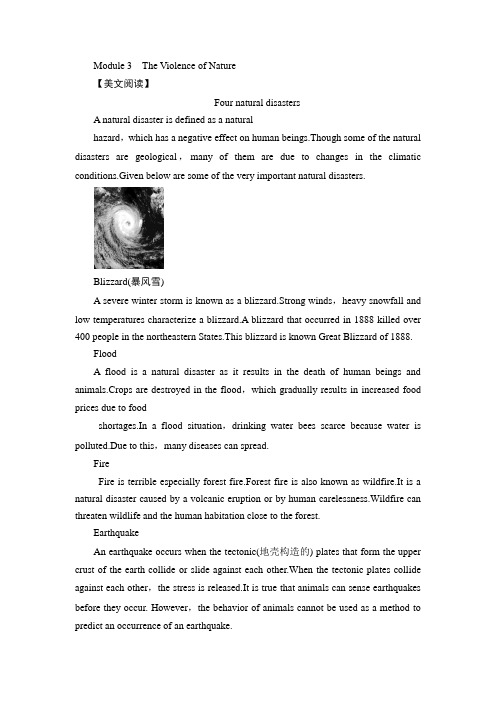
Module 3The Violence of Nature【美文阅读】Four natural disastersA natural disaster is defined as a naturalhazard,which has a negative effect on human beings.Though some of the natural disasters are geological,many of them are due to changes in the climatic conditions.Given below are some of the very important natural disasters.Blizzard(暴风雪)A severe winter storm is known as a blizzard.Strong winds,heavy snowfall and low temperatures characterize a blizzard.A blizzard that occurred in 1888 killed over 400 people in the northeastern States.This blizzard is known Great Blizzard of 1888.FloodA flood is a natural disaster as it results in the death of human beings and animals.Crops are destroyed in the flood,which gradually results in increased food prices due to foodshortages.In a flood situation,drinking water bees scarce because water is polluted.Due to this,many diseases can spread.FireFire is terrible especially forest fire.Forest fire is also known as wildfire.It is a natural disaster caused by a volcanic eruption or by human carelessness.Wildfire can threaten wildlife and the human habitation close to the forest.EarthquakeAn earthquake occurs when the tectonic(地壳构造的) plates that form the upper crust of the earth collide or slide against each other.When the tectonic plates collide against each other,the stress is released.It is true that animals can sense earthquakes before they occur. However,the behavior of animals cannot be used as a method to predict an occurrence of an earthquake.【诱思导学】What should we do in face of the disasters like tornadoes, hurricanes or earthquakes?【答案】略Period ⅠPreviewing●教学目标本课时主要是通过学生对学案所给出的内容的学习,了解本课文中所出现的词汇,初步了解课文以及相关的背景知识,对下一堂课对课文的全面理解起到一个铺垫作用。
-2021学年高中英语外研版必修三教学案:Module3

-2021学年高中英语外研版必修三教学案:Module3[技法指导]写此类文章应注意以下几点:1.要交代自然灾害爆发的时间、地点、情形、经过、成因、最后造成的损失及危害,有时也有必要交代救灾人员的情况。
2.有时也可以按照说明文的方法来写,介绍地理原因、发生的过程、造成的灾害,以及人类对这种自然灾害的认识和预防。
黄金表达:教你如何营造亮点表示发生1....happened/took place/occurred ...2.A big fire broke out ...3.An earthquake hit/struck/shocked/happened in/occurred in the district.表示起因1.What are the causes of floods (earthquake/hurricane)?2.The cause of the fire was carelessness.3.The fire was due to the fact that someone dropped a lighted cigarette.表示财产损失1....caused great damage to ...2.After the earthquake, water, gas and electricity were all cut off.3.The big floods, which occurred in 1998, caused great losses.表示人员伤亡1.Thousands of people were made homeless.2.Tens of thousands of people lost their precious life owing to the strong earthquake in Sichuan province.表示过程与处理1.The fire lasted about two hours and was finally put out in the afternoon.2.Fortunately ,the injured people were sent to hospital without delay.[写作规范][题目要求]台风是沿海地区常见的自然灾害,你一定在电视上目睹过台风来袭的场景。
高一英语(外研版)-必修三Unit 3 The world of science(3)-1教案

教学环节
主要教学活动
设置意图
Step 1
Lead-in
1)Teacher plays a short video clip about patients with Alzheimer’s disease.
背景文化知识的传授可以帮助学生拓宽知识面,克服听力中的障碍。补充阿尔茨海默病的知识可以帮助学生更好地理解听力材料的内容。
教案
教学基本信息
课题
高一英语(外研版)-必修三Unit3Listening and Speaking
学科
英语
学段:高中
年级
高一
教材
书名:《英语》(新标准)出版社:外研社出版日期:2019年9月
教学设计参与人员
姓名
单位
设计者
实施者
指导者
课件制作者
其他参与者
教学目标及教学重点、难点
Teaching Objectives:
A: Alzheimer’s disease affects the brain, causing problems with memory, thinking and behavior.
People who are 65 and above are more likely to be patients with this disease.
4)Teacher guides students to retell the invention story of this special socks by using the information they have got.
Step 4
Listening for speaking
1)Teacher guides students toread the part oflearning to learn,sharing their understanding ofexclamatory sentences.
- 1、下载文档前请自行甄别文档内容的完整性,平台不提供额外的编辑、内容补充、找答案等附加服务。
- 2、"仅部分预览"的文档,不可在线预览部分如存在完整性等问题,可反馈申请退款(可完整预览的文档不适用该条件!)。
- 3、如文档侵犯您的权益,请联系客服反馈,我们会尽快为您处理(人工客服工作时间:9:00-18:30)。
精品文档高一英语第十一次课----- 必修三module3一、考点、热点回顾(一)key words and phrases1.experience vt.经历n(可数)经历n(不可数)经验2.cause vt.引起,导致cause sb. to do sth.导致某人去做某事cause sb. trouble/problems 给某人带来麻烦/问题cause n.起因,理由,事业-------指造成某事的直接原因,后常接of或to doreason n.原因,理由------指从逻辑推理上得出的原因,后常接for或定语从句。
3.bury vt.埋葬bury oneself in =be buried in 专心于,埋头于bury one’s face in one’s hands 双手捂脸4.occur vi.发生-------指发生时,有计划无计划均可。
脑海中出现某种想法。
happen vi.发生------指事先无计划偶然发生。
碰巧作某事happen to do sth.take place 发生-------指事先安排,计划的事情。
举行。
以上三词均无被动形式。
sth. Occurs sb. 某人想起=strike/hit eg: A good idea occurred to me .It occurs to sb. to do sth.某人想起It occurred to me to visit my teacher.It occurs to sb. that…某人想起It occurred to me that I should visit my teacher.5.take off 去掉,脱掉,起飞,成功,休假,减去,移动6.strike vt&n.(雷电,暴风雨等)袭击=hit,击打,碰撞,罢工,想起=occur to,打动(1)The miners went on strike for higher pay. (2)Does this clock strike twelve?(3)A good idea struck me while I was walking along the river. (4)He hit me ,so I struck him back.(5)A huge forest fire broke out after the lighting struck. (6)I am still struck by the native beauty of the lake.7.ruin vt.毁坏,破坏,使堕落n.毁灭,崩溃,废墟in ruins 变成一片废墟8.warn vt.警告,告诫,提醒注意warn sb. of/about sth.提醒某人注意某事warn sb. not to do sth.= warn sb.against doing sth. 提醒某人不要做某事give a warning 发出警告without warning 毫无预警9.in all 总共,总计above all 最重要的是after all 毕竟at all 确实,根本first of all首all of a sudden突然all in all从各方面考虑all along一直,始终10.possibility n.可能性,可能发生的事There is a/no possibility that… 有(不)可能There is a/no possibility of doing sth.有(没有)的可能possible adj.可能的It is possible (for sb.)to do sth. It is possible that…….11.set fire to =set….on fire 放火(焚烧)…….on fire着火(状态)catch fire 着火(动作)put out a fire扑灭火12.put out 扑灭(火),伸出,出版put off推迟put up张贴,建造put away放好,收好put on 穿上,上演put forward 提出1.拿起;拾起;搭载;学会;收听2.平均3.有史以来4.到……时为止5.结束;告终6.扑灭7.放火烧…… 8.总共9.带来损害10.使某人无家可归pick up on average of all time by the time end up put out set fire to in alldo/cause damage make sb. homeless选词填空in all,set fire to,by the time,pick up,on average1. __________ you arrive, I will have left.2.__________, I spend two hours doing my homework every day.3.Sorry, I have to go to _______ my son from school.4.How much money does he owe you ______?5.Have the police found out who ________ the building?(二)Language PointsOn average, there are800 trnadoes in the US each year, causing about 80 deaths and 1,500 injuries.现在分词短语作结果状语The fire burned for 3 days, destroying a total of 25,000 buildings.现在分词短语作结果状语表自然而然的结果。
不定式短语作结果状语表意象不到的结果。
常用only/just+todoHe hurried to the station, only to find the train had left.Grammar过去完成时的被动语态1. The boy _ __ streets without pay in the old days.A. was made to cleanB. made cleanC. made to cleanD. was made clean2. These children ___ _ dance.A. were seen toB. were seen forC. were seenD. saw to3.The monkey was seen ____ _ off the tree.A. jumpB. jumpsC. jumpedD. to jump4.An accident __ __ on this road last week.A. has been happenedB. was happenedC. is happenedD. happened5. The apple _ __ very sweet.A. is tastedB. tasteC. tastesD. are tasting6. You _ more beautiful in the light blue shirt.A. seeB. watchC. lookD. look at7. Old people must be looked after well and _ __ politely.A. speak toB. spokenC. speakD. spoken to8. Old people must _ __.A. look after wellB. be looked well afterC. looked well afterD. be looked after well9. Newly-born babies _ _ in hospital.A. are taken good careB. are taken good care ofC. take good care ofD. take good care10. —How clean the window is!—Yes. It just now.A. has been cleanedB. was cleanedC. is cleanedD. will be cleaned间接引语直接引语与间接引语的转换1.The hotel manager said to me , “You have to stay in the hotel because this is the start of a hurricane.”The hotel manager said to me ____________________________________________.2.He said , “ I saw the roof of the house across the road disappear a moment ago.”He said ______________________________________________________________.3.A scie ntist said, “ Volcanic eruptions don’t happened very often on this island.A scientist said ________________________________________________________.4.The journalist said, “ The residents will travel back to the island when the danger is over.The journalist said _____________________________________________________.5.He said, “ Half the residents left the island last week.”He said _____________________________________________________________.6.He asked, “Does this mean that the danger is over?”He asked ____________________________________________________________?7.He asked her, “May I go there now?”He asked _____________________________________________________________?8.He asked me, “What were you doing when the earthquake happened?”He asked me _________________________________________________________?9.He asked the governor, “Can we go back to our homes tomorrow?”He asked the governor __________________________________________________?10.The tourist asked the local people, “ Had the fire been put out before firefighter arrived?The tourist asked the local people _________________________________________?11.I said to him,“Do it at once.” I______(said)(told)him to do it at once.12.He said to me,“Shut the window,please.” He asked me______(shut)(to shut)the window.13.I said to him,“Don’t cry!” I told him______(to not cry)(not to cry)(cry not).14.The doctor said to me,“Don’t smoke.” The doctor told/advised me______(not to smoke)(not smoke)(did not smoke).15.I said to him yesterday,“Please come early tomorrow morning.”Yesterday I______(told)(asked)(said)him to come early______(the next)(this)(that)morning.二、典型例题(一)单项选择1.[2010·天津卷] It rained heavily in the south,________ serious flooding in several provinces.A. causedB. having causedC. causingD. to cause【解析】C现在分词作状语,起补充说明的作用。
